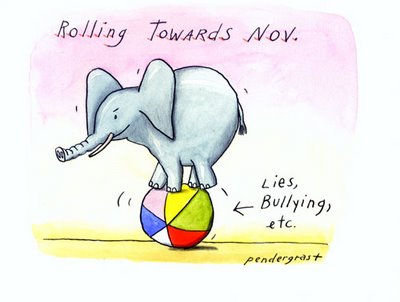The 2006 elections: a farewell to bullies

From Allen to Santorum, Hannity to Limbaugh, Rummy to Rush, last week's big losers personified a GOP culture of scorn and intimidation rejected by voters all over the country.
By Joan Walsh
Nov. 13, 2006 | The votes are counted, the Democrats control Congress, and everyone knows the 2006 election turned on two things: Iraq and GOP corruption. But before we move on it's worth savoring one more aspect of Tuesday's results: the repudiation of the culture of bullying and intimidation perfected by Republican leaders, especially since 9/11.
George Allen's defeat was the clearest example. Everyone knows he stepped in "Macaca," but the debate about the word's racial meaning threatened to obscure the basic message: Allen was caught on YouTube doing what comes naturally, bullying somebody, somebody who just happened to be the lone brown-skinned man at his campaign event. Sure the racism mattered, a lot, but it was the bullying no one could deny. And when Salon, just a few weeks later, revealed the senator's habitual use of the N-word in college, one factor cited by witnesses who came forward was seeing Allen, the bully of old, captured on that video.
But Allen's not the only bully who lost on Tuesday. In the last year Pennsylvania Sen. Rick Santorum tried to transform himself into a good Catholic conservative motivated by love, not hate, but Santorum sealed his defeat in 2003 in an interview where he equated homosexuality with bigamy, polygamy, incest and most famously "man on dog" sex. In the furor that followed, Republican leaders from Sen. Bill Frist to President Bush defended Santorum, head of the Republican Conference, who held onto his leadership post despite the storm. "The president believes that the senator is an inclusive man," White House spokesman Ari Fleischer told reporters. "The president has confidence in Sen. Santorum and thinks he's doing a good job as senator -- including in his leadership post." Pennsylvanians obviously disagreed.
Then there's Donald Rumsfeld. Given his unconscionable botching of the Iraq war, it may seem a small thing to accuse Rumsfeld of mere bullying. But his complete control over war planning and execution -- as well as over the president's perspective on them -- stemmed largely from his capacity to belittle and intimidate everyone from Condoleezza Rice to generals to the Pentagon press corps. So many images from Bob Woodward's "State of Denial" have stayed with me – Rummy "snowflaking" the Pentagon with his orders on little white post-its, micromanaging every aspect of the defense department, is one of my favorites. But one of the most damaging sections depicted his work to make sure Bush didn't pick Adm. Vern Clark, the outspoken chief of naval operations, as his first chairman of the Joint Chiefs of Staff in 2001. "Clark was the one officer who might survive Rumsfeld and preserve some sense of dignity and independence for the uniformed military," Woodward explained, and Rummy preferred the more pliable Air Force Gen. Richard Myers. Rumsfeld got his way, on that choice and countless others – at least until last Tuesday.
One bully who wasn't on the ballot last week, Rush Limbaugh, got maybe sweetest thumping of all. Here's hoping soon-to-be Senate Majority Leader Harry Reid sent the bloviating radio host flowers and candy, because he cost Jim Talent his Missouri Senate seat – and the Republicans their Senate majority -- by mocking Michael J. Fox's Parkinson's symptoms. (Thanks for having that camera in the studio, Rush -- your monstrous ego was your party's undoing.) Now Limbaugh is claiming he feels "liberated" by the Republicans' losses, because he no longer has to "carry water" for inept GOP leaders. That's just good comedy. From Vice President Dick Cheney to President Bush to beleaguered Denny Hastert after the Foley scandal, Republicans in trouble made it a point to head to Rush's studio and cry on his man-bosom about Democratic perfidy. Let's hope the nation is soon "liberated" from Limbaugh's abuse.
There's almost no way to overstate the extent of the political sea-change last Tuesday's election results represent. Allen's defeat has particular importance, since as recently as last spring he was considered a frontrunner for the Republican nomination in 2008. Allen was cut from the same cloth as Bush, two transplants to the South – Allen from Southern California to Virginia, Bush from Connecticut to Texas – who embraced certain Southern stereotypes, from cowboy boots to nicknames to a faux-down-home suspicion of book learnin', but not much Southern dignity or decency.
So what about President Bush? Has he learned from the drubbing of these bullies last week? He's pledging a new spirit of bipartisan cooperation, but I'm not optimistic. What's that old saying Bush mangled, "Fool me once...won't get fooled again?" The president who lost the popular vote in 2000 nonetheless ruled as one of the most radical leaders in U.S. history. The president who got a chance to start over, with wide popular support, in the wake of 9/11 instead ruled as the bully-in-chief, presiding over a regime that made dissent synonymous in treason. Arrogant in victory, he's humble in defeat. Democrats are to be forgiven if they have a hard time trusting the new Bush. But given voters' professed support for the party's priorities, from a minimum wage hike to a timeline for Iraq withdrawal, Democrats should be sure to test him, early and often.

0 Comments:
Post a Comment
<< Home